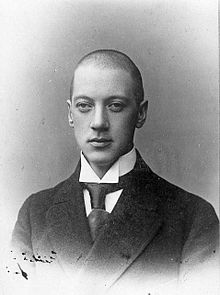Nikolai Gumilev

Nikolai Stepanovich Gumilev (also Gumilyov; Russian: Николай Степанович Гумилёв, IPA: [nʲɪkɐˈlaj sʲtʲɪˈpanəvʲɪtɕ ɡʊmʲɪˈlʲɵf] ⓘ; April 15 [O.S. 3 April] 1886 – August 26, 1921) was a Russian poet, literary critic, traveler, and military officer. He was a co-founder of the Acmeist movement. He was the husband of Anna Akhmatova and the father of Lev Gumilev. Nikolai Gumilev was arrested and executed by the Cheka, the secret Soviet police force, in 1921.
Early life and poems
Nikolay Gumilev was born in the town of

His first publication were verses I ran from cities into the forest (Я в лес бежал из городов) on September 8, 1902. In 1905 he published his first book of lyrics entitled The Way of Conquistadors. It comprised poems on most exotic subjects imaginable, from Lake Chad giraffes to Caracalla's crocodiles. Although Gumilev was proud of the book, most critics found his technique sloppy; later he would refer to that collection as apprentice's work.
From 1907 and on, Nikolai Gumilev traveled extensively in Europe, notably in
Gumilev married Anna Akhmatova on April 25, 1910. He dedicated some of his poems to her.[3] On September 18, 1912, their child Lev was born. He would eventually become an influential and controversial historian.
Travel to Africa

Like Flaubert and Rimbaud before him, but inspired by exploits of Alexander Bulatovich and Nikolay Leontiev, Gumilev was fascinated with Africa and travelled there almost each year. He explored, helping development of Ethiopia, sometime hunted lions, and brought to the Saint Petersburg museum of anthropology and ethnography a large collection of African artifacts. His landmark collection The Tent (1921) collected the best of his poems on African themes, one of them "Giraffe".[4]
Guild of Poets
In 1910, Gumilev fell under the spell of the
Dissatisfied with the vague mysticism of
According to the principles of
War experience
When World War I started, Gumilev hastened to Russia and enthusiastically joined a corps of elite cavalry. He fought in battles in East Prussia and Macedonia.[5] For his bravery he was invested with two St. George crosses (December 24, 1914 and January 5, 1915).
His war poems were assembled in the collection The Quiver (1916). In 1916 he wrote a verse play, Gondla, which was published the following year; set in ninth-century
During the
Execution
In 1920 Gumilev co-founded the All-Russia Union of Writers. He made no secret of his anti-communist views. He also made the
Legacy
Gumilev's execution placed a stigma on Akhmatova and on their son, Lev. Lev was arrested later in the purges of the 1930s and spent almost two decades in a gulag.[9]
Despite Gumilev's execution, Gondla was again performed in Petrograd in January 1922: "The play, despite its crowd scenes being enacted on a tiny stage, was a major success. Yet when the Petrograd audience called for the author, who was now officially an executed counter-revolutionary traitor, the play was removed from the repertoire and the theatre disbanded."[10]
In February 1934, as they walked along a Moscow street, Osip Mandelstam quoted Gondla's words "I am ready to die" to Akhmatova, and she repeated them in her "Poem without a Hero."[11]
Cultural influence
Although banned in the Soviet times, Gumilev was loved for his adolescent longing for travel and
- The Russian progressive rock band Little Tragedies used the poetry of Gumilev in many of their songs,[12] and had four albums which were entirely based on Gumilev's poetry (The Sun of the Spirit, Porcelain Pavilion, Return, Cross).[12][13]
- In 2016 an English translation of his verse drama Gondla was published by the Irish poet and diplomat Philip McDonagh and a production toured in Ireland.[14]
See also
- Silver Age of Russian Poetry
- 4556 Gumilyov, an asteroid named after him
- List of famous duels
Russian people in Ethiopia
Notes
- ^ Moscow News(Russia). CULTURE; No. 15. April 18, 1996.
- ^ Luknitskaya, Vera. "Materials for the biography of N. Gumilyov. Part one". Biographic Material. Retrieved 26 July 2023.
- YouTube Poem by Gumilev about Akhmatova, music and performance by Larisa Novoseltseva
- YouTube, poem by Gumilev, with English translation, music and performance by Larisa Novoseltseva
- ^ Mirsky, D. Svyatopolk (June 1922). "Obituary: N.S. Gumilev". Slavonic Review. 1 (1).
- ^ Vitaliy Shentalinsky, "Crime without Punishment" (Progress-Pleyada, Moscow, 2007) p. 286.
- ^ "Петербургские историки установили дату гибели Николая Гумилева". Газета.Ru (in Russian). Retrieved 2019-12-25.
- ^ "Предание". predanie.org (in Russian). Retrieved 2019-12-25.
- ^ Poems of Akhmatova, 1973, Staney Kunitz and Max Hayward, pub. Houghton Mifflin, pp. 15, 16.
- ISBN 1-884964-10-9), pp. 375-76.
- ^ Omry Ronen, An Approach to Mandel'štam (Jerusalem, 1983), pp. 302-03.
- ^ a b "Маленькие Трагедии". Archived from the original on 2013-05-21. Retrieved 2013-04-21.
- ^ "Little Tragedies". Archived from the original on 2009-06-15.
- ^ "Review-Gondla". AN ÁIT EILE. 2016-08-30. Retrieved 2019-12-25.
Further reading
- Владимир Полушин. Николай Гумилев. Жизнь расстрелянного поэта. – М., Молодая гвардия, 2006, 750 с. (ЖЗЛ).
- Struve, Gleb (November 1946). "Blok and Gumilyov: A double anniversary". The Slavonic and East European Review. 25 (64).
External links
- Nikolay Gumilev - Woods Reading in English on YouTube
- Collection of Poems by Nikolay Gumilev (English Translations)
- Russian Site on Gumilev
- Nikolay Gumilyov. Poems
- Works by Nikolai Gumilev at LibriVox (public domain audiobooks)

